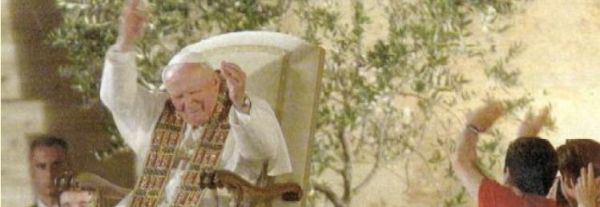7. In his activity as a teacher, which began in Nazareth and extended to Galilee and Judea up to the capital, Jerusalem, Jesus knows how to grasp and make the most of the abundant fruits present in the religious tradition of Israel. He penetrates it with a new intelligence, brings out its vital values, highlights its prophetic perspectives. He does not hesitate to denounce men's deviations from the designs of the God of the covenant.
In this way he works, within the one and the same divine revelation, the passage from the "old" to the "new", without abolishing the Law, but instead bringing it to its full fulfilment (cf. Mt 5:17). This is the thought with which the Letter to the Hebrews opens: "God, who had already spoken in ancient times many times and in various ways to the fathers through the prophets, has lately, in these days, spoken to us through his Son . . ." (Heb 1:1).
8. This transition from the 'old' to the 'new' characterises the entire teaching of the 'Prophet' of Nazareth. A particularly clear example is the Sermon on the Mount in the Gospel of Matthew. Jesus says: "You have heard that it was said to the ancients: Do not kill . . . But I say to you, whoever is angry with his brother will be brought into judgment" (Matthew 5: 21-22). "Ye have heard that it was said, Thou shalt not commit adultery; but I say unto you, that whosoever looketh on a woman to lust after her hath committed adultery with her in his heart" (Matt 5:27-28). "You have heard that it was said, 'You shall love your neighbour and hate your enemy; but I say to you, love your enemies and pray for your persecutors . . ." (Mt 5:43-44).
Teaching in this way, Jesus at the same time declares: "Do not think that I have come to abolish the Law or the Prophets; I have not come to abolish, but to fulfil" (cf. Mt 5:17).
9. This "fulfil" is a key-word that refers not only to the teaching of the truth revealed by God, but also to the whole history of Israel, that is, of the people whose son Jesus is. This extraordinary history, guided from the beginning by the powerful hand of the God of the covenant, finds its fulfilment in Jesus. The plan that the God of the covenant had inscribed in this history from the beginning, making it the history of salvation, tended towards the "fullness of time" (Gal 4:4), which is fulfilled in Jesus Christ. The Prophet of Nazareth does not hesitate to speak about this from his very first speech in the synagogue of his city.
10. Particularly eloquent are the words of Jesus reported in John's Gospel when he says to his opponents: "Abraham, your father, rejoiced in the hope of seeing my day . . .", and faced with their unbelief: "Are you not yet fifty years old and have you seen Abraham?", Jesus confirms even more explicitly: "Truly, truly, I say to you, before Abraham was, I am" (John 8: 56-58). It is evident that Jesus affirms, not only that he is the fulfilment of God's salvific designs, inscribed in the history of Israel since the time of Abraham, but that his existence precedes the time of Abraham, to the point of identifying himself as "he who is" (Ex 3:14). But for this very reason he, Jesus Christ, is the fulfilment of the history of Israel, because he "surpasses" this history with his mystery.
[Pope John Paul II, General Audience 4 February 1987]












